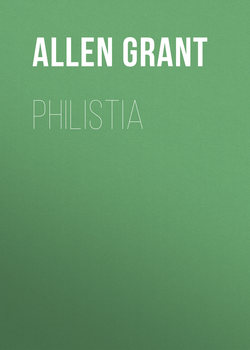Philistia

Реклама. ООО «ЛитРес», ИНН: 7719571260.
Оглавление
Allen Grant. Philistia
CHAPTER I. CHILDREN OF LIGHT
CHAPTER II. THE COASTS OF THE GENTILES
CHAPTER III. MAGDALEN QUAD
CHAPTER IV. A LITTLE MUSIC
CHAPTER V. ASKELON VILLA, GATH
CHAPTER VI. DOWN THE RIVER
CHAPTER VII. GHOSTLY COUNSEL
CHAPTER VIII. IN THE CAMP OF THE PHILISTINES
CHAPTER IX. THE WOMEN OF THE LAND
CHAPTER X. THE DAUGHTERS OF CANAAN
CHAPTER XI. CULTURE AND CULTURE
CHAPTER XII. THE MORE EXCELLENT WAY
CHAPTER XIII. YE MOUNTAINS OF GILBOA!
CHAPTER XIV 'WHAT DO THESE HEBREWS HERE?'
CHAPTER XV. EVIL TIDINGS
CHAPTER XVI. FLAT REBELLION
CHAPTER XVII 'COME YE OUT AND BE YE SEPARATE.'
CHAPTER XVIII. A QUIET WEDDING
CHAPTER XIX. INTO THE FIRE
CHAPTER XX. LITERATURE, MUSIC, AND THE DRAMA
CHAPTER XXI. OFF WITH THE OLD LOVE
CHAPTER XXII. THE PHILISTINES TRIUMPH
CHAPTER XXIII. THE STREETS OF ASKELON
CHAPTER XXIV. THE CLOUDS BEGIN TO BREAK
CHAPTER XXV. HARD PRESSED
CHAPTER XXVI. IRRECLAIMABLE
CHAPTER XXVII. RONALD COMES OF AGE
CHAPTER XXVIII. TELL IT NOT IN OATH
CHAPTER XXIX. A MAN AND A MAID
CHAPTER XXX. THE ENVIRONMENT FINALLY TRIUMPHS
CHAPTER XXXI. DE PROFUNDIS
CHAPTER XXXII. PRECONTRACT OF MARRIAGE
CHAPTER XXXIII. A GLEAM OF SUNSHINE
CHAPTER XXXIV. HOPE
CHAPTER XXXV. THE TIDE TURNS
CHAPTER XXXVI. OUT OF THE HAND OP THE PHILISTINES
CHAPTER XXXVII. LAND AT LAST: BUT WHAT LAND?
Отрывок из книги
The decayed and disfranchised borough of Calcombe Pomeroy, or Calcombe-on-the-Sea, is one of the prettiest and quietest little out-of-the-way watering-places in the whole smiling southern slope of the county of Devon. Thank heaven, the Great Western Railway, when planning its organised devastations along the beautiful rural region of the South Hams, left poor little Calcombe out in the cold; and the consequence is that those few people who still love to linger in the uncontaminated rustic England of our wiser forefathers can here find a beach unspoiled by goat-carriages or black-faced minstrels, a tiny parade uninvaded by stucco terraces or German brass bands, and an ancient stone pier off which swimmers may take a header direct, in the early morning, before the sumptuary edicts of his worship the Mayor compel them to resort to the use of bathing-machines and the decent covering of an approved costume, between the hours of eight and eight. A board beside the mouth of the harbour, signed by a Secretary of State to his late Majesty King William the Fourth, still announces to a heedless world the tolls to be paid for entry by the ships that never arrive; and a superannuated official in a wooden leg and a gold cap-band retains the honourable sinecure of a harbour-mastership, with a hypothetical salary nominally payable from the non-existent fees and port dues. The little river Cale, at the bottom of whose combe the wee town nestles snugly, has cut itself a deep valley in the soft sandstone hills; and the gap in the cliffs formed by its mouth gives room for the few hundred yards of level on which the antiquated little parade is warmly ensconced. On either hand tall bluffs of brilliant red marl raise their honeycombed faces fronting the sea; and in the distance the sheeny grey rocks of the harder Devonian promontories gleam like watered satin in the slant rays of the afternoon sun. Altogether a very sleepy little old-world place is Calcombe Pomeroy, specially reserved by the overruling chance of the universe to be a summer retreat for quiet, peace-loving, old-world people.
The Londoner who escapes for a while from the great teeming human ant-hill, with its dark foggy lanes and solid firmament of hanging smoke, to draw in a little unadulterated atmosphere at Calcombe Pomeroy, finds himself landed by the Plymouth slow train at Calcombe Road Station, twelve miles by cross-country highway from his final destination. The little grey box, described in the time-tables as a commodious omnibus, which takes him on for the rest of his journey, crawls slowly up the first six miles to the summit of the intervening range at the Cross Foxes Inn, and jolts swiftly down the other six miles, with red hot drag creaking and groaning lugubriously, till it seems to topple over sheer into the sea at the clambering High Street of the old borough. As you turn to descend the seaward slope at the Cross Foxes, you appear to leave modern industrial England and the nineteenth century well behind you on the north, and you go down into a little isolated primaeval dale, cut off from all the outer world by the high ridge that girds it round on every side, and turned only on the southern front towards the open Channel and the backing sun. Half-way down the steep cobble-paved High Street, just after you pass the big dull russet church, a small shop on the left-hand side bears a signboard with the painted legend, 'Oswald, Family Grocer and Provision Dealer.' In the front bay window of that red-brick house, built out just over the shop, Harry Oswald, Fellow and Lecturer of Oriel College, Oxford, kept his big oak writing-desk; and at that desk he might be seen reading or writing on most mornings during the long vacation, after the end of his three weeks' stay at a London West-end lodging-house, from which he had paid his first visit to Max Schurz's Sunday evening receptions.
.....
'Yes, Herbert has got a fellowship; Ernest's up in residence still looking about for one.'
'It's Ernest that would think my dress a piece of what-you-may-call-it?'
.....